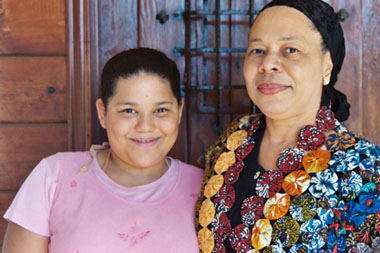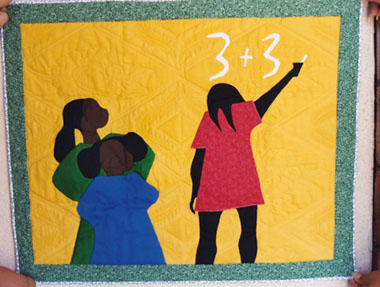 Allyson Allen and her niece and apprentice Krysta Wright recently completed an intensive seven month apprenticeship in African American quilting and doll making as participants in Round 6 of ACTA’s Apprenticeship Program. During the apprenticeship Krysta learned several new hand appliqué techniques. Appliqué involves sewing pieces of fabric onto a foundation fabric to create designs or pictures. During the apprenticeship Krysta created a wall hanging, spider puppet, and two dolls, based on the African tale of the spider weaver, which describes the origin of Kente cloth in Ghana. Allyson also created a pictorial quilt about the spider weaver and Allyson and Krysta presented their work at several different venues while telling the tale of the spider weaver and acting it out with the puppets and dolls.
Allyson Allen and her niece and apprentice Krysta Wright recently completed an intensive seven month apprenticeship in African American quilting and doll making as participants in Round 6 of ACTA’s Apprenticeship Program. During the apprenticeship Krysta learned several new hand appliqué techniques. Appliqué involves sewing pieces of fabric onto a foundation fabric to create designs or pictures. During the apprenticeship Krysta created a wall hanging, spider puppet, and two dolls, based on the African tale of the spider weaver, which describes the origin of Kente cloth in Ghana. Allyson also created a pictorial quilt about the spider weaver and Allyson and Krysta presented their work at several different venues while telling the tale of the spider weaver and acting it out with the puppets and dolls.
Allyson’s older sister taught her to sew and knit when she was a young child. Her mother, who was from Jamaica, taught Allyson to make cloth dolls and inspired a love of storytelling. Allyson learned the art of quilting as an adult from her paternal grandmother. She wanted to integrate the African American oral tradition with the art of quilting and began making pictorial quilts and giving presentations about African American history. For many years she has also taught sewing, quilting, and doll making and she is one of the master teachers in the Dolls of Hope Project which sends dolls to HIV/AIDS infected children in Africa.
Allyson prefers to hand sew and specializes in heavy embellishing and hand finishing. She explains that appliqué is a traditional African American style of quilting: “The pictorial story form is directly related to African heritage. Slaves would record things in images on quilts before they could read or write.” Other traditional African American methods of quilting include strip piecing, which uses the entire piece of fabric, cut into pieces, use of bold colors, and asymmetrical patterns. Allyson noted that African Americans have adopted European methods in their quilts too, such as the use of embroidery.
 Allyson started teaching her niece the art of quilting as soon as Krysta was old enough to operate a sewing machine and they have continued to work together on more and more complex projects. Allyson says that she enjoys having an apprentice because it helps in her own work. She explains, “I get a different perspective on projects. The way she looks at creating something is fresher and she brings up ideas that I wasn’t even thinking about.” Krysta enjoys working with her aunt and she is hoping to use some of the sewing techniques she has learned to start making her own clothing. She also helps her aunt with doll making workshops. She adds, “It’s really cool that they take those dolls to Africa. It makes you feel happy and proud of yourself that you’re doing that for them.”
Allyson started teaching her niece the art of quilting as soon as Krysta was old enough to operate a sewing machine and they have continued to work together on more and more complex projects. Allyson says that she enjoys having an apprentice because it helps in her own work. She explains, “I get a different perspective on projects. The way she looks at creating something is fresher and she brings up ideas that I wasn’t even thinking about.” Krysta enjoys working with her aunt and she is hoping to use some of the sewing techniques she has learned to start making her own clothing. She also helps her aunt with doll making workshops. She adds, “It’s really cool that they take those dolls to Africa. It makes you feel happy and proud of yourself that you’re doing that for them.”
